#that's not how it explicitly happens on the show but that is the metaphor they walked into with that one
Text
something something the villain of the season (the one about how fear can give way to extremism if you're not careful and how easy it is for many, many people to become radicalized by one person's radical hate and how genocide is a bad thing actually regardless of whether individuals of the targeted group have themselves done terrible things) being a black woman who survived an incident of indiscriminate mass murder is perhaps. not the best idea considering the themes involved
#teen wolf#tamora monroe#hollywood racism#if I could change one thing about this season it would be to cast anyone else in the role of monroe OR to not make her like that#if you want a woc who gets involved in a radical hate group yeah that can happen but not like that#it's a very tone deaf season overall which reminds me of the line from douglas in 6a where he says scott would be a good nazi youth#when a minority joins a hate group it is to double down on hating who they are because they're afraid of what it means to accept it#i.e. mixed kids being super racist because they are led to believe their non-white heritage is bad and they should try to be whiter#monroe doesn't have that. she has no connection to the supernatural. she is just afraid of the other which she refuses to understand#which would be actually interesting if monroe was a white woman who thinks she's immune to radical hate and extremism#but as a black woman who's a victim of circumstance in a random act of mass murder just for the sake of killing people#that doesn't radicalize you against where that person is from. that radicalizes you against murder.#the setup of her story is that she is essentially the survivor of a hate crime or random killing spree. which is so very relevant#that's not how it explicitly happens on the show but that is the metaphor they walked into with that one#you can't have themes where it's convenient and ignore the other implications and connotations of the rest of your work#and the implication is that they used a black woman as a primary villain (and unredeemable which is interesting bc peter exists)#as the face of the radical hate/genocide group which targets a group of mostly children simply because someone like them was bad#they're using a woc in the role of the aggressor who hates all poc because of one person from one group who did something bad#diversity win the woman of color is racist. the word of the day is 'tone deaf'#tw writers/casting department be like I don't see race and then is racist in a new and unique way
17 notes
·
View notes
Text
Still in hunger games analysis mode, do you guys ever think about what Seneca did Wrong. About where he failed at the job he was given.
Because I think what his true fatal flaw was, was he believed it. He believed in the game and all of the propoganda surrounding it.
And this was something that was bound to happen in Snow's kingdom eventually! He made citizens that were clueless and lost in his little cloud nine. You can't make killers out of your arrogant, privileged sheep population!
Seneca Crane believed that the games were about the great show, about making stars and entertaining the masses.
The cold truth that you and I and Snow are aware of, is that the games are one part of the great oppression machine. They're a good political tool to be in control of, they can be used as a punishment to target whoever you need to, you can manipulate the big show on screen in a crude mockery of what's going on in real life! You can crush the spirit of certain districts, you can keep other ones loyal to you. And the victors are an extremely valuable Product that you are endlessly creating, idols and mouthpieces for your horrible propaganda machine.
So that's what the games do! A good tool for a dictator to have, and if you're aware of all the context, then being in charge of them gives you a lot of power.
But Seneca?? Seemed to genuinely believe he was there to put on a big fancy show😭 He was so excited about it, he chatted to sponsors, he did the interviews, he picked themes😭
Like of course he gave Katniss a 12 after her stunt, he wasn't worried about the fire outfits or her popularity at All. Because he thought it'd be good ratings, and it was! That's what he thought the goal was: Get the best, most entertaining story possible.
All those talks in the Rose garden?
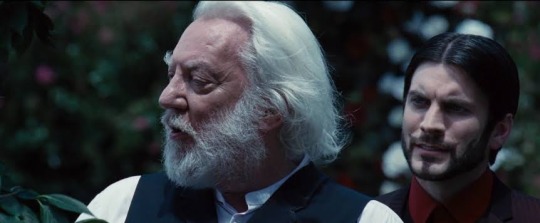
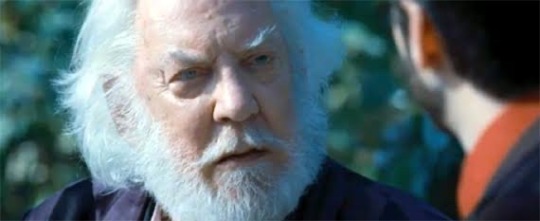
This was not Seneca checkin in with the boss, that was the boss saying Hey what the Fuck are You Doing.
Because Seneca truly did not understand at all! How dangerous it would look for someone from district 12 to rise up that fast! (And Snow most definitely understood Very Quickly because he has been dunked on before by a black haired girl from district 12😭)
But even after that Very explicitly clear talk, Seneca kept allowing Katniss chances to tell the Mockingjay story. Because he is a fool, who thought he was there to make tv😭 And did not realise that the silly story they tell in the games, has very real effects on the districts.
Like the metaphor for it could be you hire someone to make you maybe pro-military, pro-war, propaganda films, and that goes great for years until they get a few generations in and the new guys are like "oh we're just making popular films here right?" And let your direct rebel enemy, star in a touching depiction of how great rebellion is😭 And then your movie guy goes "how was that boss? Lots of people watched!" ☠️
#then movie guy head go bye bye#text post#seneca crane#Katniss Everdeen#peeta mellark#hunger games#president snow#ballad of songbirds and snakes#catching fire
2K notes
·
View notes
Text
So… I’ve been turning all this over in my head since last night, and I wanted to make a post about vampiric transformation as sex, and how it’s being used in wwdits as a metaphor for sexual repression, sexual freedom, virginity, and cuckolding.
Before I even get into the obvious metaphors about virginity and cuckolding, I think we need to talk about the elephant in the room. Guillermo’s sexual repression and how that’s come to find an outlet in his vampiric longing.
Guillermo is highly repressed, sexually speaking, but I don’t think he’s asexual. He’s shown interest in sex several times, but in an uncomfortable “this can’t be for me yet” kind of way. He was clearly raised Catholic and has internalized a lot of that shame re: sex, especially gay sex. He wants intimacy, but he’s also internalized the idea that wanting these things is dangerous and shameful.
But… the vampiric world seems to symbolize all the things that Guillermo wants but cannot have. He wants to be strong, powerful, attractive, and sexually liberated. As much as their openness about sex embarrasses him, there’s a certain longing there, too. He didn’t just want to be handsome as a vampire — he explicitly used the word “sexy.”
A vampiric Guillermo is a version of Guillermo that gets to have sex. Loudly, proudly, and without shame. It’s a version of him that is wanted, that wants, and who gets to have the precise kind of intimacy he's always craved.
Now, how much Guillermo has actually done sexually is still up for a lot of debate in fandom, but I think that’s kind of immaterial. For most of the show, Guillermo clearly wasn’t having the kind of intimacy that he wanted to be having, and he only started to even begin to allow himself to seriously consider all that in s4, when he got a boyfriend and came out to his family.
As being gay and wanting to be a vampire.
Guillermo is finally starting to own both his homosexuality and his vampiric life, and that means he’s finally starting to explore sex.
Now… At the end of s4, I talked about how Guillermo going to Derek in the finale had the air of a person who’d been fantasizing about losing their virginity in a certain way all their life — but then they finally give up on those dreams and hire a sex worker instead. There’s a resignation there in Guillermo that he couldn’t get it “the old-fashioned way,” he’s disappointed and jaded when it comes to intimate relationships, and now he’s tired of waiting for love and just wants a business transaction.
I wasn’t quite expecting for them to push that metaphor even more in s5! The money aspect was almost forgotten (Did… Derek even take the money? Why is he still cleaning toilets?) but the scene with Derek biting Guillermo was clearly a metaphorical virginity scene.
Guillermo’s nervous eagerness, his growing realization that this wasn’t actually the way he wanted it to happen. Asking Derek if he’d ever done this before and figuring out if he was “ready.” Taking off his clothes (that his grandmother got for him, even, that’s a whole meta post right THERE) and trying to make the vibe “right.” His insistence that though Nandor had never done this for him, they still had a caring and intimate relationship.
But… it was also a metaphor for bad sex. Many people lose their virginity in a way they don’t find satisfying, and Guillermo definitely seems to fall in this category. It was awkward, it was bloody, it hurt, his partner didn’t listen to him, they weren’t on the same wavelength, they didn’t connect, there was no emotional bond, and most importantly, he didn’t feel changed.
Like a lot of people do, Guillermo thought losing his virginity would change him. He’d be cooler, sexier, more powerful. His station in life would change. He’d become an adult his ideal form. But he’s still just Guillermo.
As he told Laszlo, as soon as he did it, he regretted it. He immediately knew that he’d been right, that this wasn’t the way he wanted to do it. He wanted to do it with someone experienced who loved and cared about him, who listened to him, and he wanted that person to be Nandor. But he wasn’t patient, he paid an inexperienced acquaintance for a one-night-stand instead, and he was left feeling deeply unfulfilled.
Most upsettingly, he immediately discovered that, like virginity, you can’t lose it twice. He can’t just have a do-over with Nandor now. He’s given something up that he can’t give to anyone else, and he’s going to have to live with the consequences.
Because like sex for humans, transformation has social implications in the vampire world. It can only be done in very specific situations. Guillermo seems to have grown up in a human world where sex should only be happening within a heterosexual marriage, and now he’s finding that in the vampire world, transformation is only supposed to happen between a master and familiar currently in a contractual bond.
So… him going to Derek and finding “outlet” in another relationship, so to speak, is effectively vampirically cuckolding Nandor. He’s given that honor to another vampire, which Nandor seems to find both vampirically humiliating and personally hurtful. It would in fact hurt him so badly that he would probably not survive it, in Laszlo’s words.
(There’s also definitely an element of an abusive “if I can’t have you, no one can” vibe in Nandor’s threat to kill Guillermo and then himself if Guillermo got what he needed from another vampire, but since when have we ever liked them well-adjusted?)
Guillermo is realizing that, as much as he’s been thinking of this in sexual terms, so have the vampires. He thought he was the only one who thought it was a big deal. He thought he was the only one placing intimacy and partnership and loyalty into this event. But now he’s realizing that as much as it meant to him, it might have even been a bigger thing for Nandor.
For Guillermo, vampirism-as-sex represents the idealized transformational aspects of losing your virginity. He’d built up this big event in his mind that represented his intimate bond with Nandor, he’d built up this idea that the event would change him, would make him better, would make him free. But he’s finding, like many first-timers do, that sometimes it’s not transformational. It’s just awkward and disappointing and the only thing that’s changed is that you ache in the morning.
He still doesn’t have the intimacy he wanted. He still doesn’t have the ability to be loudly himself. He still hasn’t been able to fully own his sexuality and ask for what he wants. He wasn’t ready. He didn’t enjoy it. He regrets it.
He also regrets it because now he knows it will hurt Nandor and the relationship they’ve built. Because for Nandor, vampirism-as-sex represents the societal aspects of sex. The rules people follow. The societal humiliation you feel if you’re cuckolded. The personal agony you feel when you’re cheated on. The sense that your home is broken if your partner goes to find satisfaction with someone else.
Guillermo, who has had to deal with societal disapproval of his desired type of sex in the human world his whole life, was viewing vampiric transformation as a way to be free of all that. The shame and the repression and the societal penalties for being himself.
But he’s just found himself in a mess of new rules, hasn’t he? Different culture, same struggle. And while the vampiric world has always symbolized a sexual liberation that both repulses and attracts Guillermo, he clearly doesn’t have as much freedom here as he thought.
So… to sum up, Guillermo always kind of thought of transformation as losing his virginity. He associated vampirism with sex, and he thought this would be his entrance into the sexual world. He wanted to have an intimate experience with Nandor, but eventually gave up on that and decided to pay for it — and then immediately regretted it, both because he found it personally dissatisfying and because it came as a betrayal to the man he loves.
The problem is that he thought he was the only person thinking of it as sex — he didn’t realize that Nandor does, too, just in a very different way.
Nandor was also thinking of vampiric transformation as this special act, and one that belongs only to him as Guillermo’s master/partner. He was thinking of it in intimate terms, but also in societal partnership terms. He’s thinking of his household, while Guillermo was thinking of things on more individualistic terms.
If only they’d both talked about all this shit even once. :’)
But that’s not how we do things here in Staten Island!!! We just long for things ineffectively, keep secrets, and fuck everything up!
(There’s also a whole thing here about how Nandor wasn’t keeping his side of the relationship bargain and that’s why Guillermo looked elsewhere in a moment of weakness, but I guess that’s probably a separate post. This is long enough already.)
#I could talk about this so much more but this post is so long lmao#well guillermo you can never give nandor your first time but that doesn't mean you can't still build a relationship with him#more important for a guy to have your future than your past right?#lmao we'll see#nandermo#wwdits#wwdits meta#long post#wwdits spoilers
2K notes
·
View notes
Text
What I Mean When I Say, "I Ship Huskerdust"
When I say, "I ship Huskerdust," I don't mean that I think it would be a perfect example of a healthy relationship. Because it wouldn't be.
They've both got issues that they would need to work through if they wanted their relationship to succeed.
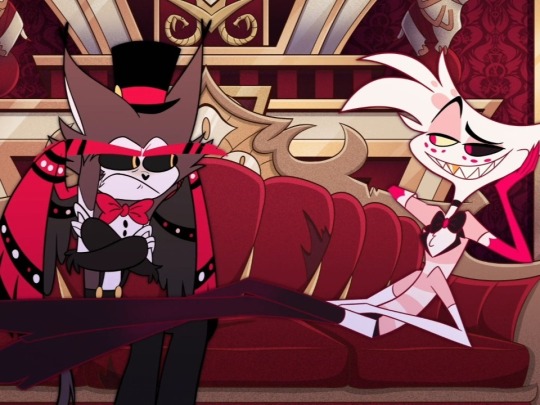
On Angel's side, there's the fact that his prior interactions with Husk basically consisted of him flirting with Husk, and Husk making it clear that he wasn't interested, and Angel ignoring that and doing it again. That's harassment.
Yes, Angel stops doing it after Episode 4, but he never explicitly apologises for it. That was a missed opportunity, in my opinion. It was a change for the show to say loudly and clearly, "Hey, trauma sucks, we get that, but it's not an excuse to treat people badly yourself. You grow by owning up to your mistakes and trying to be better than the person who hurt you."
Speaking of trauma...
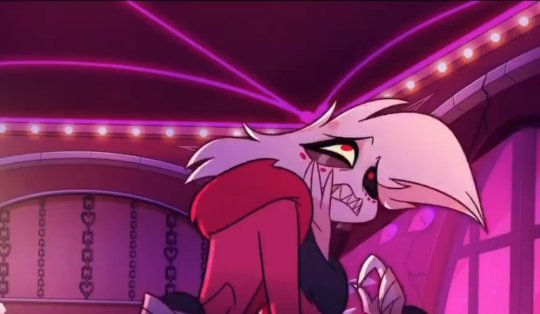
Angel is being abused by Valentino and exploited in the porn industry. That's not a personal failing. It's not Angel's fault. But it has affected him deeply, and it's something that he and Husk would need to work through.
It's not going to be all sunshine and rainbows. Angel will cry, Angel will get angry, Angel will lash out. He will behave inappropriately, and he will keep being hypersexual because he knows how to do it and sometimes it feels like the safest option. And he will have no idea how to just rest with a loved one and trust them. So Husk will need to be the bigger person and take all the ups and downs and keep loving Angel through the dark days.
But I don't know if Husk has what it takes to do that.
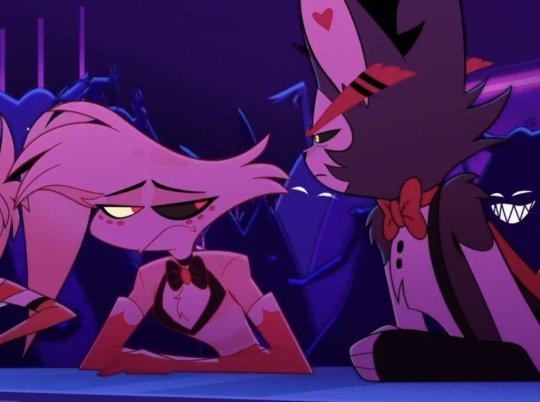
That leads me nicely onto the issues on Husk's side. For starters, there's his judgemental attitude. He's a gambler, and therefore believes he can read people and know everything about them. Angel's "It's not an act!" outburst shakes Husk and makes him realise that he didn't really know what was going on.
But even after that, Husk is still judging Angel. It happens in Episode 6, when Angel is offered drugs by Cherri Bomb and Husk says, "Look, you wanna fuck up all your progress, be my guest. I just ... I just thought you were better than that."
Addicts can relapse if they go back to their old environments and old relationships. It happens. And it's probably not a good idea to be so condemnatory about it.
Can you imagine what Husk's reaction would be if Angel really did relapse? Would Angel feel safe opening up to Husk again if he knew how badly Husk could take it?

Sometimes, it seems as though Husk puts Angel on a pedestal. In Episode 8, when he tells Angel, "I guess you have changed," Angel doesn't look convinced, instead changing the subject. Husk sees Angel as better than Angel thinks he is.
And that goes hand-in-hand with when he was judging Angel more harshly in earlier episodes. Husk applies higher standards to Angel.
I think part of the reason why Husk is so hard on Angel is because Husk sees something in Angel that he doesn't see in himself - youth and potential. Husk has made it clear that he isn't trying to get into Heaven. He probably doesn't think he deserves it. That's why he told Angel not to look for answers to problems at the bottom of a bottle, but continued to drink himself.
My theory is that Husk is working on Angel because he finds it easier than working on himself.
It's much easier to judge and boss around others than to acknowledge and rectify your own flaws. To borrow a metaphor from Jesus Christ himself, Husk is trying to take specks of sawdust out of Angel's eye while he's still got plenty of planks in his own eye.
One of those planks being his complicity in the Overlord system.
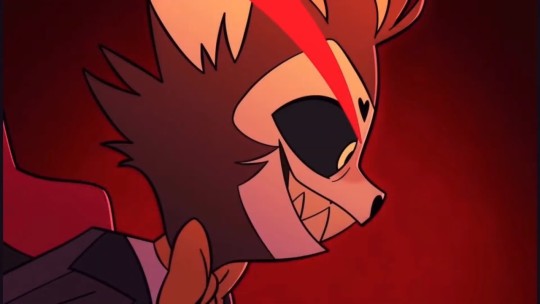
Yes, I should probably mention that Husk used to be an Overlord. He used to participate in the very system that is now trapping and torturing Angel.
And he gambled with the souls that he owned! He put their afterlives at stake! Can you imagine being owned by Husk, thinking you knew where you stood, and then waking up one day to be told that you were now owned by someone else? Potentially someone as bad as Valentino?
(Now, I don't think Husk ever actually played a game with Valentino, given that he can't seem to remember Val's name in Episode 6, but still, the implications are horrifying.)
Angel didn't have too big a reaction when Husk opened up about his past. But that's probably because he was still reeling a bit from his own outburst. Once it had sunk in, how did he feel?
How can Angel feel safe and loved around someone who used to own souls and gamble with them carelessly? Someone who apparently still has his Overlord powers? Someone who could turn into yet another Valentino in the wrong circumstances?
How can a romance work?
Can a romance work?
Despite all of that?!
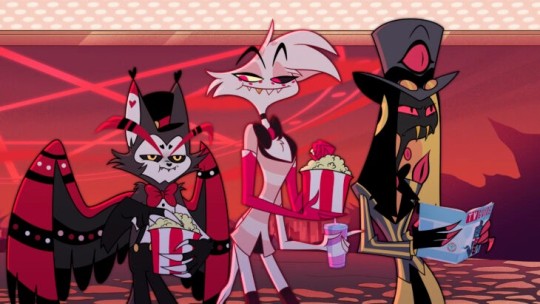
No, when I say, "I ship Huskerdust," I don't mean, "I think they're fluffy and adorable and 100% unproblematic." I mean, "Huskerdust contains interesting dynamics that are fun to explore." There's something about their interactions that I enjoy.
And Huskerdust could be a good way for the cartoon to dive into its themes of redemption and second changes.
Husk could change Angel for the better. We can see that, after Episode 4, Angel is willing to be more honest about what he's going through. He actually tells Niffty about the gruelling 16-hour shift Valentino put him through, instead of trying to pretend he's been all right.
If they became an official couple, Husk could show Angel what it's like to have someone genuinely care for him and his wellbeing, not just use him for money-making or self-gratification. Since Husk isn't interested in Angel's hypersexual porn star persona, it would be a chance for Angel to take the time to figure out who he (Anthony?) really is.
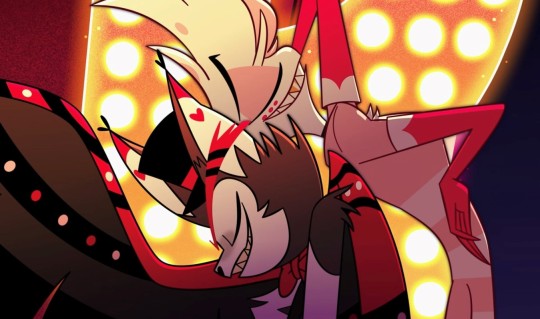
Angel could change Husk for the better, too. Other Tumblr bloggers have pointed out that Husk seemed to be drinking a little less after Episode 4. Perhaps watching Angel attempting self-improvement encouraged Husk to give it a go as well, albeit in a more low-key way.
And if Husk was the one who got Angel out of his contract with Valentino, that would be a great culmination of his character arc. It would be his own personal redemption for participating in the cruel Overlord system, because he'd be freeing someone from an Overlord's control. He'd be correcting his past mistakes. I for one would love to see that in a future season.
That is what I mean when I say "I ship Huskerdust."
TL;DR Angel and Husk are not perfect people, not by a long shot - but they could be perfect for each other.
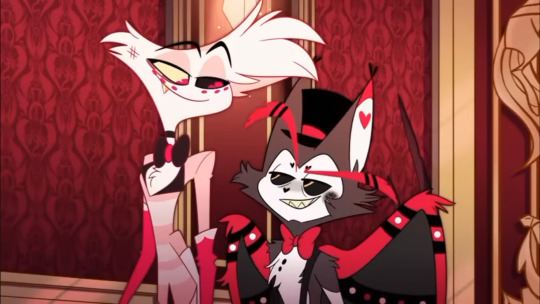
#hazbin hotel#angel dust#anthony hazbin hotel#hazbin hotel anthony#husk hazbin hotel#hazbin hotel husk#huskerdust#valentino hazbin hotel#hazbin hotel valentino#cherri bomb#niffty#sir pentious
267 notes
·
View notes
Text
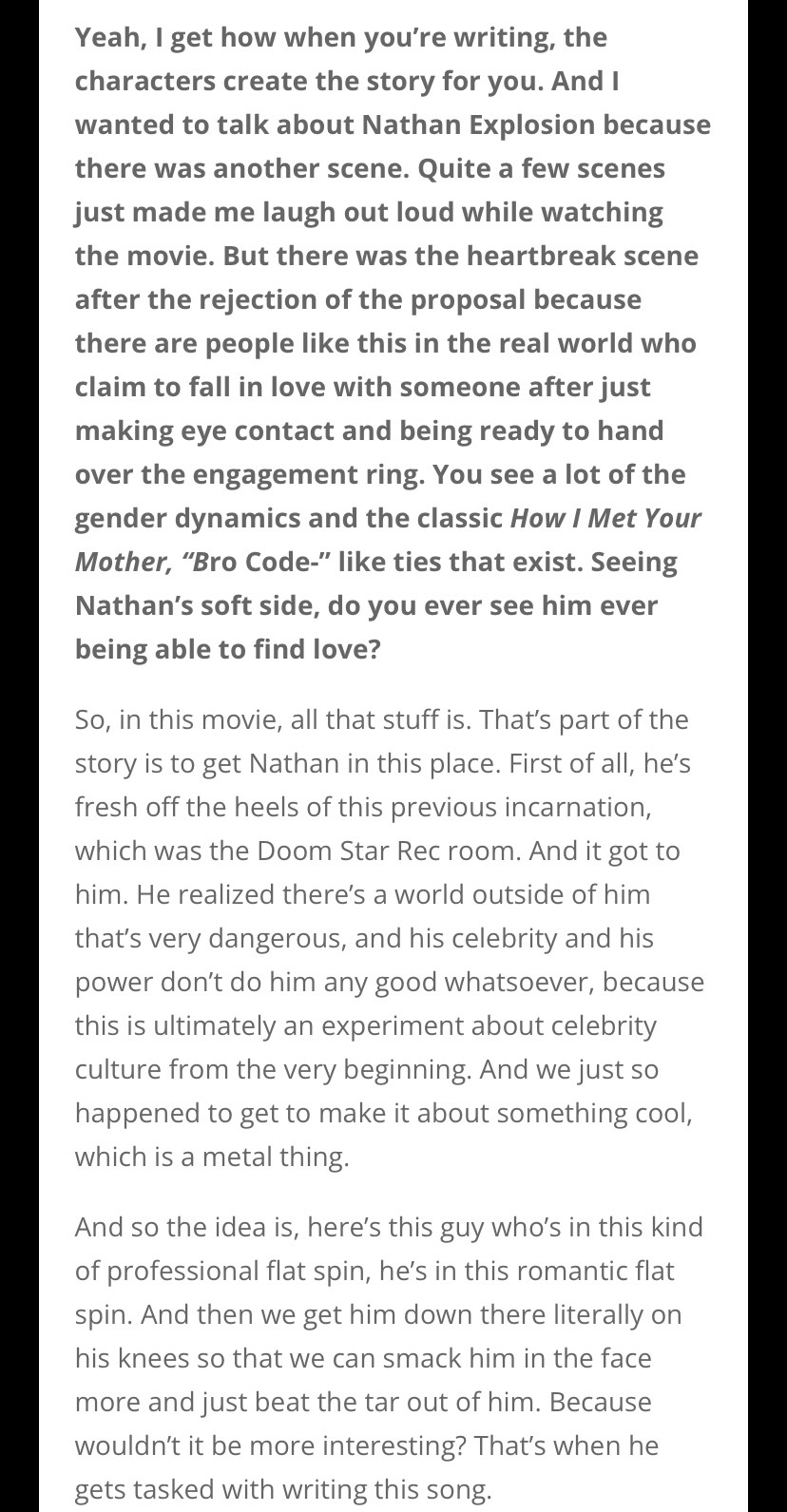

[MetalInsider]
a couple of the times recently Brendon has talked about the themes of Masculinity. I may add on to this as I recall stuff, because there is actually depth to the stupid dick jokes throughout the show and the movie, it’s just happens that he’s explicitly acknowledged that more recently
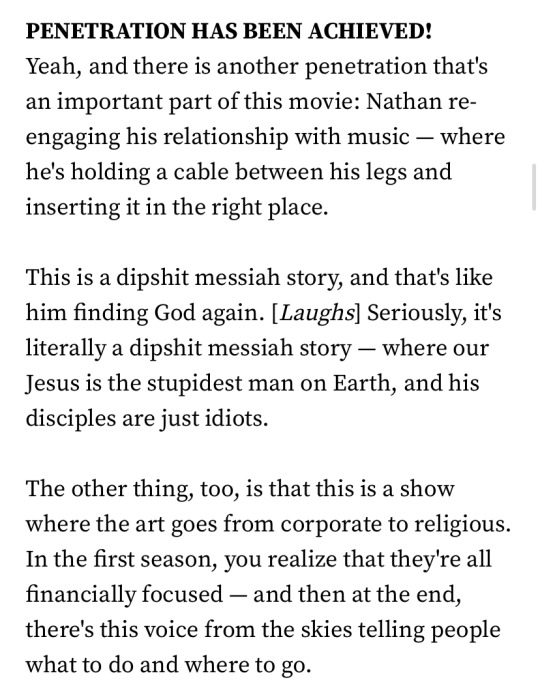
where he’s basically talking about the scene where Nathan reconciles with the band and apologizes to Abigail, he’s literally reconnecting with them and consummating the relationship.
But this theme is present in A LOT of the show, like I can’t stress enough how many times a dick joke doubles as some metaphor for their characterization. For instance, “Black Fire Upon Us” (the episode) has the alternate title “Dethrelease” because it followed Dethrecord, where they’ve finished it and now they’re trying to release the thing, But it’s also called Dethrelease because half of the episode is spent on the band (minus toki) trying to suck their own dicks. They’re interrupted by Toki being hurt and they talk to each other about how they’re not supposed to care about each other, go back to trying to suck themselves off (unsuccessfully) and throwing a release party (celebration of themselves) which gets cut short because mordhaus is attacked by the people who want revenge on Dethklok for how they’ve been hurt by the band’s selfishness. At that point they’re finally forced to be selfless but it’s too little too late and their manager is dead, and they can’t get their release.
Going Downklok follows the same logic, with “going down” taking on 3 meanings. That scene in the movie becomes the final answer to it.
idk it’s just sad that there’s like 0 people around who actually want to talk about it because I’m pretty fascinated by the whole thing but I feel weird talking about this lol
especially for how long he’s been addressing it,
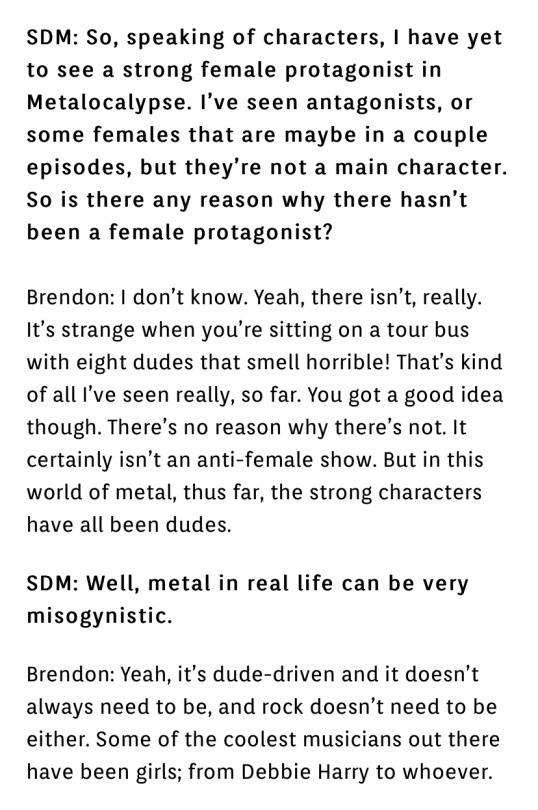

October 2009 November 2009
Like he reflected on it in that month’s time and came back with that answer haha, but it stuck.
back to another recent interview;
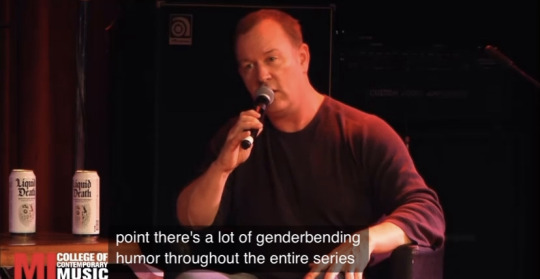
I’ve considered it a lot and I think that with the movie there’s an overarching theme for all the characters where they have to confront their relationship with masculinity and what they consider femininity, in addition to what they literally call “gay” throughout the series (emotional investment and sincerity). In the show, their relationship with women and femininity is represented by their respective mothers. And in the movie, in order to finally mature, they have to embrace their “feminine sides” so to speak. Which is more or less the point of this line:

#Going downklok has more uncomfortable aspects to it if you’re a trans pickles truther bc I think he’s put into the womb - devils cave#I like it a whole lot better as Brendons way of deconstructing masculine & creative relationships than a cisman writing a trans male charac#ter#metalocalypse#brendon small
59 notes
·
View notes
Text
Hazbin hotel songs rated by whether or not they happened diegetically
Always chasing rainbows
While this is background music, it does not strain credibility to think that this song exists and has been sung before by Charlie in the hazbin universe.
5/10 not diegetic but not entirely metaphorical
Inside of every demon is a rainbow
The singing for sure happened. Some of the visuals strain credibility for what could have happened in a news room.
7/10
Inside of every demon is a lost cause
This literally happened.
10/10
Happy day in hell
Charlie is for real just like that.
10/10
Hell is forever
It's possible that Charlie did just start singing to Adam, and if that part is diegetic than Adam's lyrics are too. The visuals do get pretty metaphorical, however.
6/10
Stayed gone
Vox spent 7 years writing a disstrack for alastor, only for alastor to come up with a cutting rebuttal in all of 2 minutes. They are iconic. The metaphorical parts of the visuals happen in clearly marked metaphorical spaces.
8/10
It starts with sorry
I'm at a point where I'm assuming any singing done by Charlie is literal. The background strays from the world of the show, but the characters never do.
9/10
Respectless
For the songs that we know for a fact to have happened to have happened, one of the givens of the world is that there is musical magic in hell. With this in mind, there is no reason why this song couldn't have happened.
10/10
Whatever it takes
They are having a duet from miles away. No matter what magic is in play, I just don't buy that that is a thing they can do.
3/10
Poison
The only way this song could be diegetic is if Valentino spent all night filming an erotic music video, and the idea the song didn't come from angel diminishes it's impact.
2/10
Loser, baby
An outside observer comments on the song
7/10
Hells greatest dad
The singing happened. Absolutely none of the visuals did.
4/10
More than anything
Charlie takes after her father, who will also appearantly just start singing. Where the visuals differ from reality, it is flashback, not a metaphor. The singing is still happening in physical space, the audience just doesn't get to see it.
9.5/10
Welcome to heaven
This happened, and it's interesting because it implies that heaven might have the same song magic. But at the same time, it almost feels like a rehersed routine.
10/10
You didn't know
What the hell. Heaven has song magic too. That might as well be true.
10/10
Out for love
It adds meaning to say that this happened. Carmine is dancer. The rhythm is part of her characterization.
10/10
Ready for this
We are explicitly told that this happens several times.
11/10
More than anything 2.0
As a couple, this is just how they have important conversations.
10/10
The show must go on
Ok so if the spatial distance broke my suspension of disbelief in whatever it takes, and the timespan the song takes place over broke it in poison, there is no way this song can get a pass. It takes place over at least several days, between characters that are miles apart, and it happens out of chronological order. This did not fuckin' happen. Like at all.
-1000000000/10
#hazbin hotel#charlie morningstar#vaggie hazbin hotel#alastor#lucifer#hazbin hotel vox#hazbin hotel velvette
66 notes
·
View notes
Text
So I saw this post talking about how grace is the most tied to Nibbly which makes sense. She hungers for power, sex, food metaphors with dirty girl soup, which said post already discussed. But also Nibbly is kind of the most prominent one in the summoning scene other than wiggly which would make sense if this is Nibblys ending. Especially because grace is consuming the souls of the horny, those who desire sex, those who are hungry for it. Which aligns with Nibblys modus operandi in Honey queen. Those who hunger taste sweeter. Also makes sense as to why Nibbly's apocalypse is basically a happen ending. He has a pretty sweet gig already. Cult of followers, regularly getting fed, he even gets to walk the earth annually. I make sense that he wouldn't want to change hatchetfield that much and he needs to keep some people alive so he keeps getting fed.
So if TGWDLM, BF, and NPMD show Pokey, Wiggly and Nibbly's respective apocalypses then maybe we'll get 2 more musicals for blinky and Tinky.
From what it looks like, the next show in Hatchetfield (which might not be the next Starkid show, I heard they wanted a break) is going to be about Miss Holloway. And who did she explicitly make a deal with? Tinky! So my guess is he's going to be our next apocalypse. Miss Holloway talks explicitly about him in Killer track and also we know there's a ton of time shenanigans going on with her. I'm like 99% certain if they do the Holloway show he's our main villain. They could do a time loop story, that could be fun, or a million other time travel concepts. I think it would be cool if Frank was involved. We know he was friends with Miss Holloway from Daddy and having a toy store owner and collector would be fun as hell to face off against Tinky. I think a Tinky show is also the perfect time to properly address the lore around the split timelines. We have some stuff but we could get more and now would be a great time as presumably the penultimate show.
As for the 5th show, this is understandably more amorphous. But if I'm right we're talking Blinky. I have a few vauge ideas of places it could head. So one is that they could focus on Rose from Killer track. She's a musician so performance is kind of her thing, maybe the band gets big and that deal with celebrity voyerism and spectacle. And hey I'd like to see her more developed. My other theory is linked with his reference in TTTO. So Jack Bauer mentioning "the watcher with a thousand eyes" in that show is an explicit forth wall break. Said watcher is the audience. And that makes me wonder if a Blinky show could lean into that more. Have the audience be Blinky in some way. And of this would presumably be the finale, a forth wall breaking ending could be a good way to bring closure to the fact that this is a split timeline. Or maybe go full TTTO hand have multiple endings the audience gets to choose. Like which ending they want. Maybe one apocalypse does have to happen so the audience gets to choose who's. This is way more speculative though.
As for setting for these two it's complicated. They like to set the shows at a black altar. But there's 5 and all 5 have already been settings. I think either it's completely new or Tinky is CCRP and Blinky is the starlight theatre. It kinda feels like it's stepping on Pokeys toes a bit but they're both more backdrops. I can't see either at the Wayland's (maaaaaybe Tinky because it's where the black book is in NPMD and Miss Holloway obviously uses it but eh) and Hatchetfield high is so clearly the setting for NPMD where as TGWDLM dots about places so much that there doesn't seem to be as definitively a setting. That being said I do think the high school is Blinkys alter and all the others have come through at their alter (Nibbly's being the Wayland's where grace gets the book) so maybe we get another teen show for blinky. But then again Miss Holloway is working at Hatchetfield high too now so maybe her show will be there as well. At the very least I think the finales will be at their set altars. Blinky comes through at the high school and Tinky at the CCRP
#hatchetfield universe#starkid#lords in black#miss holloway#nightmare time#nibblenephim#nibbly#pokey#pokotho#blinky#blinklotep#tinky#t'noy karaxis#wiggly#wiggog y'wrath#npmd#nerdy prudes must die#black Friday#the guy who didn't like musicals#TGWDLM
147 notes
·
View notes
Text
The Pristine Blade
I've played a whole lot more of Slay the Princess, and it is excellent, but I've been wondering, why the 'Pristine Blade'?
Obviously it represents the power you have over the Princess in the dynamic, and how that dynamic develops over the chapters depending on your relationship to that power (see the achievement you get for handing the Blade to the Witch: Past Life Gambit, Hand your power to a suspicious character), but why a Pristine Blade?
Most of the voices are happy to call it a knife, or a dagger, or whatever else, or even ask for different weapons, but the Narrator is insistent on calling it the Pristine Blade, every time, which does make sense. It is one of the few constants in these scenarios, next to you, the Hero, the Princess, the Woods (most of the time), and the Cabin. As with those others, it was made fit for purpose by the Creator, perhaps with some details filled in by the Long Quiet's conceptions of reality (one aspect sure is, but we'll get to that).
What is the Pristine Blade?
For this, I'm going back to my Otherverse roots (hi, StP fans, read Pact and Pale), and analysing this as an Implement, which is what the Narrator explicitly refers to it as.
First off, it is a knife. Knives have purposes beyond enacting violence, but this particular one is a knife made for killing, there can be no doubt about that. You can still use it for other purposes, of course (like cutting the Thorn free), but showing up with it still marks you as a killer (and the Princess responds as such).
Secondly, it's small, which means it can, in fact, be hidden. The Opportunist is the only voice to consider this, but it is an important aspect, since it has its effects on you even if not showing it visibly.
Thirdly, it's small. This means that, to do its job, you need to get close and personal. You cannot keep your distance (which is why several voices wish you had something better) and, while it's suggested, in the Nightmare route, that you can throw it, in practice, the Paranoid can only do so much to keep your body functioning, and that kind of dexterity isn't part of it.
This makes it an intimate weapon, which sure is fitting for the dynamic between you and the Princess. Every time you use it, or choose not to, you are saying something about this relationship, and influencing how you both develop in the wake of the cycle of violence and revenge it enables.
But that doesn't explain the insistent terminology.
Why 'Pristine'?
The Pristine Blade is something implanted into the Construct by the Creator, it exists in every reality, and every iteration of the Narrator expects it to be in the Cabin even when it isn't, and every time, it is Pristine.
It is always perfect, almost the platonic ideal of a dagger, cutting through anything except the Razor (including bone!) with ease and it, too, is temporaly 'sticky'.
When you move from one chapter to the next, the scenario the Construct is running resets, except for you and the Hero (and whatever other voice you've picked up), the Princess (and the changes wrought upon her), and the Pristine Blade. And the Pristine Blade, too, remembers what happened, where it's supposed to be:
If you died with it in hand, or having it forcibly taken from you, it will be right where the Narrator expects it to be in the chapter after, but if you gave it to the Princess, either by actually giving it to her, like in the Witch route, or having it fulfill its purpose by stabbing her heart (and boy, there's a metaphor), it will be with her in the chapter after.
But even if the scenario itself states ages have past, the Pristine Blade is still that, Pristine.
Because it is unchanging. It will never be anything other than Pristine. It is, in some sense, stagnant, a constant. In short, it is the Long Quiet's weapon.
The Long Quiet's Weapon
The Long Quiet was created to slay the Shifting Mound, to end death, by putting a stop to change, transformation in all sense, and thereby ridding the world of doom, of the cycle of life and death.
And the weapon to do this is the platonic ideal of intimate violence. A constant, never changing, in this relationship.
Yes, in part this is because the Shifting Mound and the Long Quiet were once one, and their split wasn't perfect, so each carries a kernel of the other within themselves, but how delightfully ironic for stagnant violence to be the thing intended to destroy change in order to kill death. What a perfect encapsulation of the futility of the Creator's mission.
In the final confrontation, the Shifting Mound tries to convince you to join her by pointing out how you are both so familiar with the cycle of violence and revenge, and clearly this means she's speaking your language, and maybe she is.
But she doesn't have to be, because at almost every juncture, you could choose to leave the Pristine Blade behind, or wield it not to be violent. And every time you choose to leave the cycle of violence and revenge behind, to choose not to have power over the Princess, or at least use it with respect to her, it changes things, and it changes them for the better.
#Slay the Princess#the Pristine Blade#first StP essay#essay writing's back on the menu boys#this one got a bit away from me at the end#because I'm tired#but if I put this in my drafts it's never getting done#so here we are#enjoy!
140 notes
·
View notes
Text
In Season 2's Becoming, after being outed as the Slayer to her mother, Buffy delivers a monologue in which she insists she never wanted to be a Slayer ("do you think I choose to be like this? do you have any idea how lonely it is, how dangerous?") and that she wishes she could be doing almost anything else with her life ("God, even studying") but she doesn't have a choice ("I have to save the world, again"). Indeed by the end of the episode that obligation to put her own desires aside and do whatever's necessary to save the world will force her to send the man she loves to hell. Being a Slayer explicitly costs her everything she cares about ("I've got nothing left to lose", as she tells Whistler even before killing Angel).
So, obviously, large sections of the Buffy fandom on here have decided that this means Buffy loves being a Slayer and has fully accepted it as a part of who she is, that she has no rational reason to resent Giles at all, and that she only leaves town at the end of the episode (leaving a note behind for her mother and not telling anybody else) because her mother doesn't accept her and "kicks her out of the house" (an empty threat that Buffy takes so literally she's back in her bedroom packing for LA before the episode ends).
.... I mean, you do see how at odds with the text this reading is, right? However much you want Joyce to be the singular villain here, she's really not.
Buffy: "I never wanted to be a Slayer and in fact being a Slayer has made me miserable and I'm going to run away and change my name and hide from my Watcher so I don't have to be the Slayer anymore"
The fandom, incessantly: "hoho, Joyce blames Giles for Buffy running away, how ridiculous".
(Yes, there is a popular metaphorical reading of the show in which Buffy being "the Slayer" should be understood as Buffy being bi or trans or otherwise queer. And yes, in this reading Joyce's reaction to finding out the truth about her daughter-- already not great! -- becomes particularly terrible.
But that specific metaphorical reading is the not the One True Way of understanding the show. It's not something to which every single thing that happens on screen can be reduced. It's simply one interpretation among many and, in some episodes -- like this one! -- it works less well than it does at other times.
In the actual text of the show, Buffy has just told her mother that she's a reluctant child solider recruited into an impossibly dangerous conflict by a man who Joyce barely knows. A man who has insisted Buffy keep this all secret from her mother and lied to her face about it for months (Giles wouldn't even let Joyce know about vampires after a vampire trying to hurt Buffy attacked her in her own home! He didn't let her know about Angelus!)
Of course Joyce is upset about this! Of course she blames Giles! You know who else often blames Giles for Buffy having to be a Slayer? You know who started this season with a nightmare in which Giles tried to murder Buffy? Buffy herself.)
41 notes
·
View notes
Text
one thing about the “cannibalism as a metaphor for love/desire” spike on this website is that there really aren’t that many examples of this trope. you can say it all goes back to hannibal but that is fundamentally not how hannibal lecter operates - he doesn’t care about the people he kills and eats even a little bit and he says as much in the show. in the terror, most of the heroes literally do NOT resort to cannibalism - even though james begs francis to use his body after he dies (selfless love?), francis (as well as the other men) cannot bear to do it and bury him instead. goodsir, probably the most saint/martyr coded character, also refuses to eat human flesh and even weaponises his own body against those who do, killing himself and the perpetrators of cannibalism rather than continue living like that. and no matter how you look at it, hickey does not kill and eat gibson (or anyone else for that matter) because he loves them. he is literally asserting dominance in a survival situation to avoid becoming a victim himself.
yellowjackets is complicated because of the specific homoerotic nature of the relationship between shauna and jackie, and you could argue there’s a certain seduction that happens when jackie’s corpse is “talking” to shauna. the frenzied scene when the girls eat jackie is portrayed as some kind of dark force taking them and there are a lot of emotions tied up in it but it’s not straightforwardly “they love jackie and jackie loved them and would want them to live”. ravenous has a similar homoerotic tone and ives’ seduction of boyd into a life of cannibalism could easily be a metaphor for gay desire, but the film also explicitly critiques “manifest destiny” and colonial greed through the lens of physically consuming anyone who stands in your way.
now let’s talk about actual examples of this trope. in raw, cannibalistic desire IS actually combined with the emotions of sex, and the most moving scene in my opinion is the ending in which the dad reveals a heavily scarred torso from his wife’s bite marks, indicating that he still loves her in spite of, or maybe because of her nature. in society of the snow, and indeed in actual accounts from the survivors of the andes plane crash, many of the boys who initially hold out from eating the dead are persuaded by the comparison to the eucharist - jesus gave his body so they could have spiritual life, and their friends died so they could have physical life. the dead and consumed are conceptualised as ultimately loving and selfless; if everyone had survived the crash, all of them would have starved to death. and in my personal favourite cannibal movie, bones and all, it’s kind of a mixture of all of the above. the first time maren consciously bites someone with intent to eat them, it’s framed as this sexual awakening (again tied up in gay desire with the way it evokes fear and disgust in others). lee is also presumably bisexual and faces homophobic comments from his family. one of his early experiences with cannibalism was eating his own father (do i need to explain this). there’s so much i could say about maren’s mother and how she is portrayed as an “addict” who physically cannot control her impulses to eat people. and then of course there’s the ending where lee dies and begs maren, who has been denying her true nature for so long, to eat him and have him become part of her forever. because he literally loves her and he wants her to eat well
tldr is that hannibal and the terror aren’t even close to portraying cannibalism as love and idk what you guys are talking about half the time
37 notes
·
View notes
Text
"at least natalie's death was narratively satisfyin—"
no. it wasn't. they gave us a character who has struggled with addiction her whole life. struggled with self-harm in a variety of forms. who has felt lost and guilty for the last twenty-five years. a character who has been suicidal multiple times in the past, a character who was literally suicidal a week ago.
and you killed her a day after she started to actually, truly try to heal.
yes, this show has always been dark. yes, from the first moment of the entire series we knew these girls committed unspeakable violence on one another, and did so ritually. yes, we knew that the adult versions of these characters spent the last twenty-five years struggling with their guilt and shame and trauma, and were doing it very, very poorly.
all of this just shows that the story has been in their struggle. this has been—or at least it was initially sold as—a show about women and their trauma. a show about women who don’t know how to examine their trauma, don’t know how to process it. who can’t take more than small glances at what happened, but who can also never, ever forget that it’s there. this has been a show about women who are coping, most times poorly, but very, very realistically.
and there was so much hope in that, despite (or because) this is such a dark show. these women can screw up and struggle and be real people—which women never get to be on television—and still maybe, they can heal bit by bit. there was always an inherent hope in this story, because they were all still, as adults, trying to make a life for themselves even if they were muddling through it.
in season two, natalie starts to heal at the retreat. (apparently—i personally found her 180 between "qui" and "burial" highly suspect and very poorly executed, but that's a moot point now.) she spends most of the season struggling against lottie, but finally accepts lottie's therapy (thanks to lisa) and beginning with "burial" she keeps trying to get the girls to talk about what happened. she figures out what she needs to move forward—to finally, truly address what happened in the wilderness by talking about it. that becomes her goal, and her focus with the others.
but natalie doesn't get to talk about anything. the girls want to drink instead of talk in "burial". and in "it chooses," the second nat suggests they talk, lottie shuts her down and suggests they drink poison instead. natalie is sober, and trying to do what she thinks she is supposed to do by confronting her trauma. she has made all of the "right" choices to actually heal from her pain, but she never gets to.
natalie’s entire story line, set up in her very introduction in the pilot, is to find her purpose. she talks about her self-destructive behaviors being due to her lack of one, and makes it clear that she intends to find that purpose once she leaves therapy. thus, for natalie’s story to be narratively satisfying, her story needs to end with her finding that purpose, right? which means that, if we are to treat this as a narratively satisfying ending, then natalie physically sacrificing her life for lisa is supposed to be that purpose.
but death is not a purpose. and, to portray it as such for a character who has tried to commit suicide is, honestly, disgusting to me. especially for a character who was saved—again, a week ago—from her attempt by the very woman who then encourages her to drink poison that is used to "put animals out of their misery". who is then told in her death vision to “let the wilderness in” (when "the wilderness" has been a pretty clear metaphor for trauma!!!). they spent all season telling a suicidal character to suddenly let go and give in and stop resisting in a narrative that leads to her “””finding purpose””” in her fucking death. not to mention letting that death be recorded as "an overdose" after she has been explicitly sober as part of her growth!!
a far, far more narratively satisfying path for natalie is for her to actually find a purpose that is consistent with the hunter-protector she’s always been described as. in “no compass” tai says that natalie is the reason they all made it out of the wilderness. (again, wilderness as a metaphor for trauma!) so why, on earth would the better story line, the more consistent story line, the more satisfying story line—especially when this show is all about parallels and cycles repeating—not be natalie leading them all out of “the wilderness” by helping them process the trauma? by getting them all to talk about it?
(i didn’t necessarily need or expect yellowjackets to give a truly “good” message or resolution—bittersweet would be plenty for me—but can you imagine the beauty of that story? the character who has felt nothing but pain and guilt, who has been alone for the majority of her life, who has never felt good and stable love, being the one to break through the trauma first? the one who finally learns to heal first, and protects them all once again by leading them through the wilderness? a story of a woman supporting women through trauma that only they can understand?)
instead natalie's story goes from struggling with her pain and guilt, to trying to find some purpose in her life, to losing that purpose and attempting suicide, to being saved and actually starting to address her trauma head-on. and then dying before she can. i'm sure there are some people who believe that this is character growth (the briefest moment of addressing her trauma), but it wasn't; her growth is blunted by her death.
and this makes her death both tragic and unsatisfying. a character who struggles so hard and so long, who finally, finally sees a light, and the moment she reaches for it, is shifted back to where she was a week ago, having never gotten to actually grow.
so no, just because i am personally devastated by nat's death does not mean that i am blind to the narrative; quite the opposite. i am furious both as a fan of the character and a fan of the story. i feel deceived, disappointed, and insulted by every single part of this story. i feel like we were all cheated out of what could have been a beautiful exploration of a complex and fascinating character. and on top of all that i am very, very hurt.
#yellowjackets#yellowjackets spoilers#yellowjackets meta#natalie scatorccio#anti yellowjackets#yellowjackets critical#i'm so sad and mad right now i'm shaking tbh#mine#wordles#~#suicide cw#addiction cw#I AM FUCKING FURIOUS
188 notes
·
View notes
Note
chelloooo the tmnt getting more racist thing is actually rlly interesting to me because I don’t think it’s getting more racist , I just think that as more and more pieces of media with good Asian representation come out (eeao, amphibia, and even elemental are the first things I can think of) there’s more stuff to compare it to and realize that tmnt is just… not it. And that although it’s gotten less blatantly stereotypical, it just hasn’t followed the curve of good Asian representation in media. It continues to be lacking. It improves in small ways. It’s just slow
and I also think it’s because how tmnt handles japanese and east asian culture in general took such a fucking nosedive with mutant mayhem. Look at splinters entire character and the fact they learned to be ninjas from mostly popular chinese movies. Like almost everything about this movie shows how much the creators were looking through it with an orientalist lens
Like. I don’t think tmnt is getting more racist, I think the amount of racist shit is staying relatively the same.* So as western culture and pop culture starts to be less racist, tmnt starts to look more racist as a result. And also because socially and culturally speaking, tmntmm is Rlly Bad. Like look at it once with ANY IDEA of racist stereotypes and it’s Bad. It would have been fine like any year before 2023. But compare it to any popular piece of media that’s come out in the past 1-3 years and its…. Lord. It’s not it ………
(I like tmntmm etc. I just have to ignore a lot of the racist stuff in it, as I have to do with most pieces of media. But for something that came out in the 20s it’s so much harder to turn a blind eye to it than other stuff.)
*imo it improves the most with rottmnt. But that show was also racist in other ways, just not towards japenese culture. It handled being asian american and an immigrant surprisingly well
(also for judas’ followers who don’t know me I’m asian 👍) -angie and jonah
OHHH YOU PUT IT PERFECTLY INTO WORDS. Tmnt isn’t really getting more racist it’s just improving very very slowly compared to a lot of modern media.
Like it feels weird when racist stuff happen in old media but you kind of expect it in old movies & tv- but when it’s still present in modern day it’s kinda more noticeable.
And yea I feel a similar way about mutant mayhem, it’s very good in a lot of ways! Racially isn’t one of them!
Not even just with Asian stuff either- which I think you’ve covered pretty well here- but from a black perspective it’s not great either. superfly is kind of weird to me cuz he’s clearly black and his coding is clearly pulling from black culture and he’s all macho and chains and I love that for him. I think he’s so cool.
But he’s basically just another one of those villains who’s an oppressed person who’s faced violent discrimination and fought back- and that in itself is framed as explicitly evil. Him telling the story of how he was being chased by a mob and faught back is when we’re supposed to start thinking he might be evil.
and so he’s like, coded as an activist or civil rights leader, but instead of fighting for equality rights he wants to kill all white people (in a metaphorical sense) and it’s like oh ok cool. This again. Greatttt.
Anyway point is: ur so right
87 notes
·
View notes
Text
Queer Metaphor and Queer Literality
People have been comparing Our Flag Means Death and Good Omens a lot, but the similarity that stands out most to me is on the meta level of how they do their storytelling. I think they both feel like a similar flavor of meaningful queer story because they depict queerness at both a literal and a metaphorical level, where the positive elements occur at the literal level and the negative elements are depicted through metaphor.
On a literal level, both series are full of explicitly, textually queer characters who have actual romances with kissing and everything. Characters can be trans and express their gender in non-normative ways without reprecussions (mostly). There's almost no depiction of overt homophobia onscreen. I'm not sure whether Neil Gaiman or anyone else involved in GO has talked about this choice, but I know David Jenkins has said that he wanted to avoid making the characters in OFMD constantly deal with homophobia and queer trauma. It's not that they take place in queernorm worlds, exactly; it's more that the bad stuff largely happens offscreen. (I've addressed this in an OFMD meta about season 1.)
But the thing is, neither show actually shies away from depicting homophobia and queer trauma - it's just that they happen at the metaphorical level.

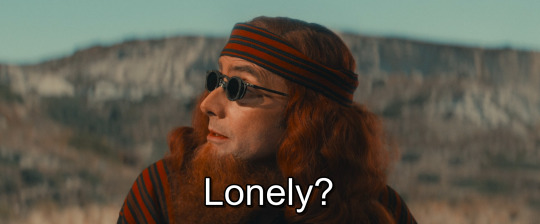



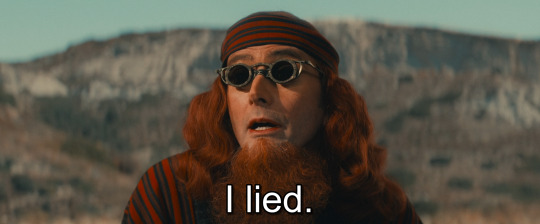
In GO2, both Crowley and Aziraphale's relationship to heaven and hell is, metaphorically, that of queer people to a stiflingly heteronormative society that will never truly let them belong and be themselves at the same time. They find community in each other - they are the only people in the world who have experienced the things they've experienced (and isn't that a relatable queer feeling!), and they also find community in queer humans, in a way. But to their home societies that originally gave them belonging and purpose, they're outcasts, and that's very lonely for both of them. They both deal with this very differently; Crowley abandons heaven and hell entirely and embraces his outcast-hood and independence (even though it's still lonely), while Aziraphale still longs for that sense of belonging and eventually decides to try to assimilate again (even though he can't really be himself there).
There's a lot more you can say about metaphorical queerness in GO (like in this recent Tor.com article). But basically, Crowley and Aziraphale's differing reactions to the ostracism of their native society mirror two different ways a lot of real life queer people respond the ostracism of their native societies, even though Crowley and Aziraphale themselves don't really face explicit homophobia for their queer romance onscreen.
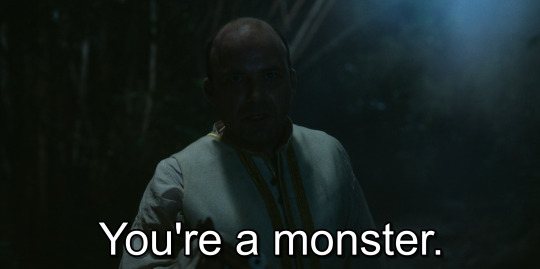

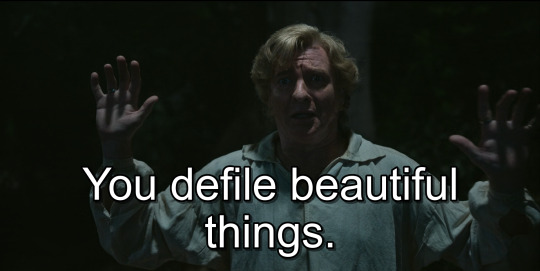
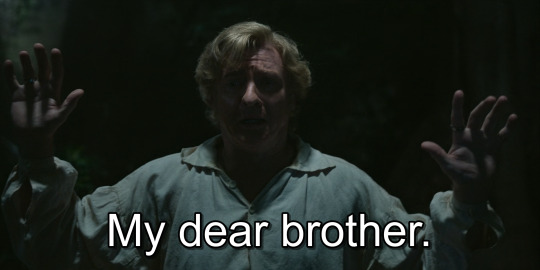

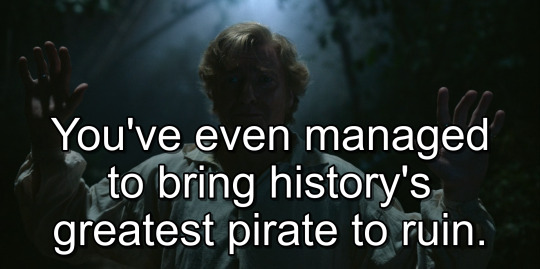
OFMD intertwines the metaphor with the literal in a different way. In a way, piracy is a metaphor for queer community; we've all heard Izzy's "piracy is about belonging to something" line in the trailer (even though we don't know the context yet.) But pirates also commit acts of violence, and most people consider them horrible monsters. Stede and Ed both struggle with feelings of monstrousness that are about their piracy-related actions on the surface; but those feelings are instantly and horribly recognizable to a lot of queer people. Chauncey Badminton's "you defile beautiful things" speech is burned into my brain in part because that's exactly what my internal monologue sounds like sometimes (and I think you can pretty easily interpret that speech as being about Stede being literally queer as much as it's about Stede killing his brother; Badminton comes just short of outright saying it.)
When Stede leaves Ed, Ed dives headfirst into being the monster everyone believes him to be. He hates himself; he thinks he's unlovable; he commits as many atrocities as he can in the hope that someone will put him down, and he'll deserve it. I think he feels that Stede left him because Stede, too, saw him as an irredeemable monster, and he tries to make it true to justify his own self-hatred. Ed's self-destructive rampage is an over-the-top expression, in the context of a pirate story, of some deeply recognizable and relatable queer emotions. It's easy for society to make us feel monstrous; Stede dealt with that by trying to remove his influence from the world and return to the (heterosexual) status quo, and Ed dealt with it by trying to live up to the monstrousness he felt inside himself until it destroyed him.
I think one reason these two shows have been so effective - and been effective in similar ways, to more or less the same group of fans - is that this combination of literal queer joy and metaphorical queer suffering feels like a very deep, authentic, relatable portrayal of queer experience. It's fun and wish-fulfillment-y, and avoids getting too close to the reality of the negative experiences a lot of fans have probably had. But at the same time, it filters those negative, complicated, and familiar experiences through the lens of the fantastical, which gives them a certain clarity and emotional grandeur that they couldn't have in a work more true to life.
I'm pretty skeptical about equating "representation" to quality (I've read a lot of deeply mediocre queer books), and I don't think it's quite accurate that these shows have been so successful simply because they depict queer protagonists in queer romances; I think that take misses something, because in this day and age, there are a lot of queer romances out there and easily accessible. But I think the way queerness is embedded into multiple levels of storytelling in both these shows gives them a lot more depth of meaning and emotion, and I think that's a big part of what fans have latched onto.
#our flag means death#ofmd#good omens#ofmd meta#good omens meta#ofmd stede bonnet#ofmd blackbeard#ofmd os#ofmd s2 spoilers#ofmd spoilers#ALSO if you like stories that are queer on both literal and metaphorical levels of storytelling#please watch revolutionary girl utena and sarazanmai
116 notes
·
View notes
Text
Kang’s bids for affirmation
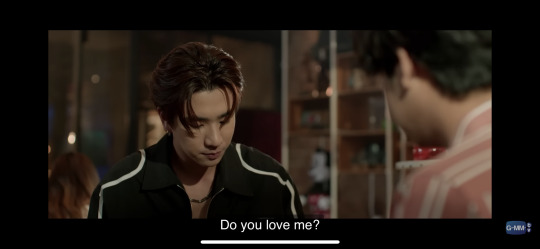
Since Kang and Sailom officially got together, I think Kang would leap to say that he’s happier than he’s ever been and that he feels loved and supported; I’m kind of shocked he hasn’t gone so far as to say that Sailom ‘completes him’ or is his ‘other half’ as those seem like the kind of ridiculously romantic things he likes. In the past two episodes, we’ve repeatedly seen him giggling and throwing out ridiculous pick up lines and draping himself over Sailom like an eager puppy.
But what’s stuck with me is the sheer number of times Kang has now asked Sailom for emotional validation. A little out of order—
First, the moment above. He was happy being cheesy and then abruptly got serious when he asked “Do you love me?” He even followed up to make sure Sailom understood he meant it:
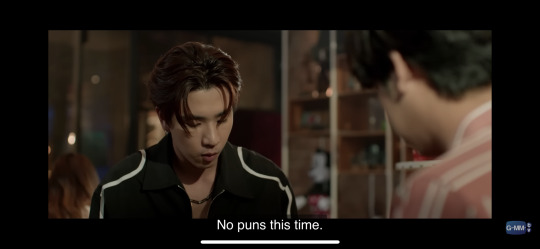
He often asks questions like this, although that was probably the most explicitly he’s worded it to date:
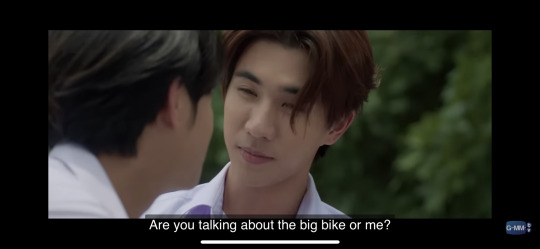
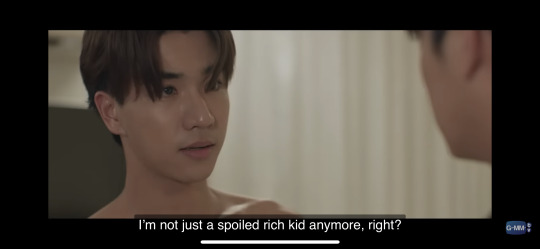
(There is more happening in this ^ particular scene but he’s throwing Sailom’s own words back at him, so it’s clear he needs Sailom’s assurance specifically)
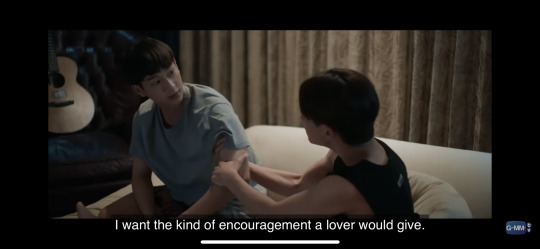
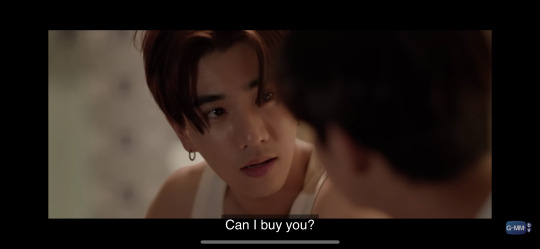
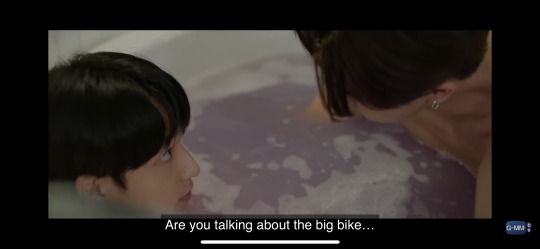
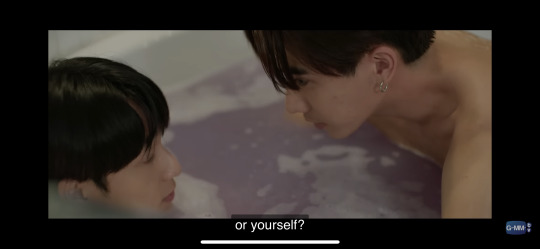
Those are all emotional bids. He also makes frequent requests for physical affection (asks for consent to be intimate), which are undeniably related on some level — but he’s also a teenage boy who wants to touch his boyfriend so they stand a little apart! I only captured two screenshots as I wasn’t initially looking for this so I know I’m missing more:

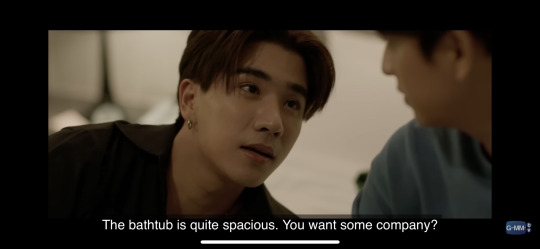
What all these asks tell me is that on some subconscious level Kang has recognized that Sailom is maintaining walls beyond them and it is making him anxious.
One of those walls came down last week when they had sex (putting in a screenshot just because I can and because I’m in love with this scene):
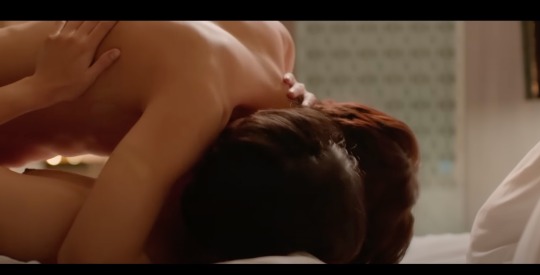
The bigger emotional walls — the ones that will be harder for to Kang recognize, let alone vocalize — remain, however.
The closest Sailom has come to admitting the depth of his feelings (that we’ve seen, not including the offscreen discussion about how long Sailom has liked him that I am STILL SALTY about missing) are these two moments:
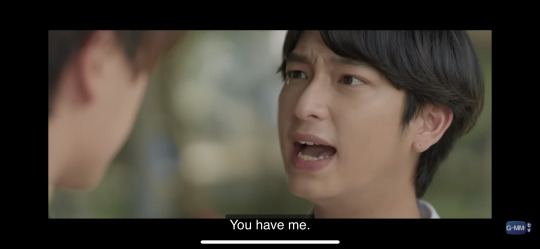
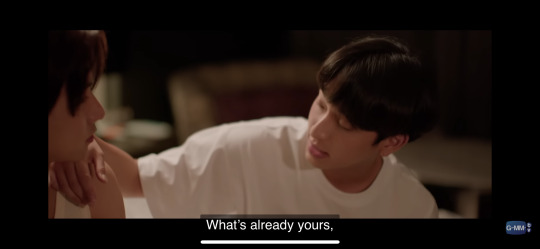

But the first was truly a crisis situation. And the second one is a metaphor! He is not using the word “I” anywhere in there. He’s still keeping his feelings at a distance.
While Sailom is happy to be supportive and affectionate in many ways — cheering Kang on at football, coming on this trip with him, giving him so, so many hugs — those times are always focused on Kang. If Kang needs him for reasons that don’t have to do with their relationship, Sailom is there.
But Sailom has not given Kang the opportunity to repay that in any way (yet!). He pretty consistently acts like he does not need anything from Kang. He doesn’t admit to fears or insecurities or anything that makes him vulnerable.
In that very first scene above, Sailom never says “yes, I do love you”. He doesn’t even take a bite of the fruit Kang offers. Although he very much plays it off as a joke, this is what he says:

He’s now turned down Kang’s concerns about his debts twice. The first time, he left a door open — he focused it on his concerns about Kang giving up his football dreams and Kang was able to take comfort in the idea there was still a path for him to help Sailom:

The second time bears a deeper look because I think it genuinely upset Kang.
When they arrive at Khorat, Kang says this:

WE are super rich. He thinks of them as a package duo. What’s mine is yours.
But when Sailom shuts him down, he says this, with no further explanation:
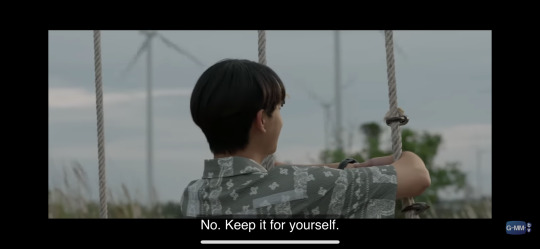
Essentially — no, it’s YOUR money. (We are not a team in this)
And watch Kang. He physically recoils. He opens and closes his mouth like he wants to say something. And he’s silent for a pronounced period of time.
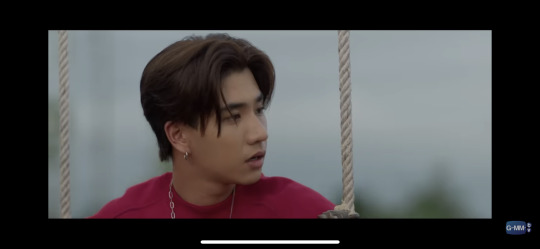
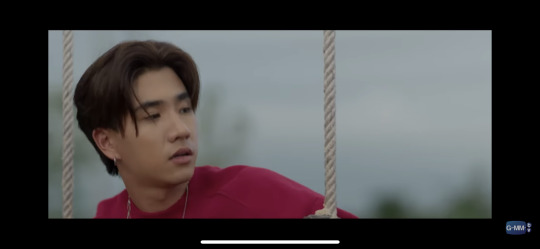

You can see him starting to think something along the lines of “I love you so much, why won’t you let me show you that?”

And then he asks what is an objectively bizarre question after Sailom has just TURNED DOWN HIS MONEY — ‘would you like me if I didn’t have any money’. He is starting to recognize that he needs more from Sailom — things he isn’t fully ready to put into words — and it misfires as this.
It really feels — to me — like Sailom has been trying to prove, whether to himself or to Kang, that if he didn’t have Kang he would be “fine”. That he is self-sufficient and he could make his own way in the world.
On some level, this is admirable. But on another level, it’s drive by fear. He’s so scared of losing Kang that he’s actively keeping him at arm’s length.
And Kang is noticing.
When Sailom finally willingly lets Kang in — because he has to — I think he’s terrified that it’s going to scare Kang off. Instead, Kang is going to be so desperately grateful for the opportunity to be there for him. What Sailom thinks will ruin them will only heal an ever-increasing divide between them. It’s going to be beautiful to see.
#kanghansailom#dangerous romance#dangerous romance the series#kess babbles about dangerous romance#sailom homchan#kanghan kirttin sukprasert
64 notes
·
View notes
Text
they really did give me exactly what i needed to be okay with a prison ending. and it comes down to the fact that the way they did it respected the ambiguity in the concepts of justice, crime and punishment threaded through the entire show.
it’s the fact that jimmy’s sentence is basically treated as arbitrary, when it comes to it being ‘justice’ for his sins. we get all these numbers: seven years, hundreds of years, eighty-six years, ‘with good behavior, who knows?’ years. and none of them is treated as some sort of definitive ‘what he deserves’ punishment, because at the end of the day, being able to put an objective number there isn’t the point. everyone during jimmy’s sentencing wants different things (jimmy, oakley, marie, etc), and only some of those things are actually related to ‘justice’. the prosecutors want him to do time, but they also don’t want to ruin their perfect records by going to trial. how can a number be objective justice, when it means something different to everyone? there’s also the fact that some immoral things aren’t anything that people will put those sort of official numbers to. philosophically speaking, crime is in the eye of the beholder, not the system, and therefore so is responsibility. which was pretty perfectly encapsulated by the ‘that thing with your brother, that wasn’t even a crime’ ‘yes it was’ exchange.
if anything, i really love that how much of his sentence he is actually going to do (or how bad his prison experience is) is up to the viewer. because it puts the responsibility back on the viewer to conceptualize justice, instead of the show putting its faith in either the system’s concept of justice, or even the concept of the showrunners themselves. the writing does make a judgement on jimmy (that prison isn’t, at the very least, wrong for him), but it doesn’t lock the audience into that judgment, or the specifics of it. if you want to think that jimmy is beaten up every day and never sees kim or anything in the outside world again, there’s certainly enough there in the reality of prison to believe that that’s what happens to him. but if you want to believe that he and kim work some legal magic, and all the inmates love him, the show also gives you enough to believe that instead. it doesn’t tell you what justice for jimmy is, and it shouldn’t. because that would be inconsistent. i think it made prison exactly the correct amount of fake and metaphorical--basically, just enough for the viewer to still have to interrogate their own definition of justice.
it helps that at no point does the show portray prison as good in and of itself. jimmy explicitly conveys that most prisons are hell (and reminds us of the prison murders in breaking bad for good measure) and does his best to avoid it. jimmy doesn’t act like prison is a great way to atone, and the show doesn’t condemn him or kim for being hopeful at the idea of him doing less time. his entire motive for taking the eighty-six years is really just to see kim again, and to publicly mend the tears in his identity, thereby making himself someone that she can love again. if jimmy feels peace, it’s because of his reconciliation with himself, and with kim. not because being locked up is itself a mechanism of personal transformation, or an inherently meaningful gesture of remorse. the ending is bittersweet precisely because prison is a serious, serious sacrifice. he got his humanity back, but it’s come at a steep cost.
and yet, again, it comes with the grace of: you can still imagine the justice you want. you have to imagine it. which is just about the best balance i can think of.
1K notes
·
View notes
Text
the episode of heartslabyul — the contradiction of cater diamond
The Episode of Heartslabyul chapter 21 scanlations is credited to Octopotscans!
The comparison shot comes from turtlesoupscans!

Maybe it’s just me, but the manga adaptation does a great job of demonstrating how alone Cater is without explicitly drawing attention to it. A lot of the lines characters speak are directly carried over from the game, but the use of space and framing in various panels helps to convey a sense of emptiness. It’s purely visual storytelling, done and implying more without spelling it out with words.
Chapter 21 covers the period following Riddle’s Overblot; there’s lots of emphasis on reconciliation between the dorm leader and other characters: Riddle and Trey; Riddle and Yuuken, Riddle and Ace, etc. Then you also have interactions between Ace, Deuce, Yuuken, and Grim—just some good ol’ bickering between the main group of idiots 😂
For context, Cater suggests that Trey and the headmaster see Riddle to the infirmary (which explains their absence in the pages below). Then Cater says to himself that he’s thankful that Yuuken and co. stepped in to save their dorm leader, but is quick to deny that he said anything at all when asked about it. This also happens in the game, BUT LOOK AT HOW THAT SAME SCENE IS CONVEYED IN THE MANGA 😭
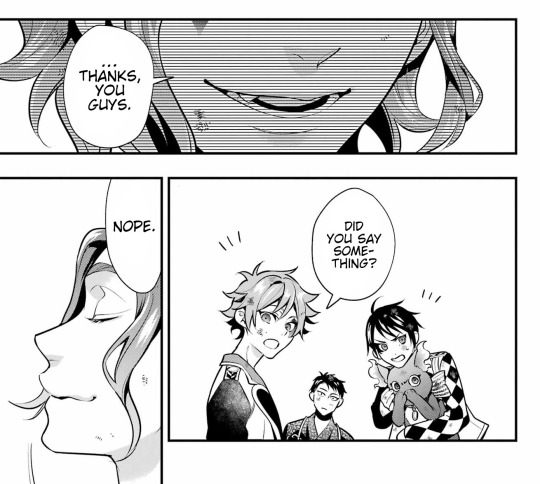
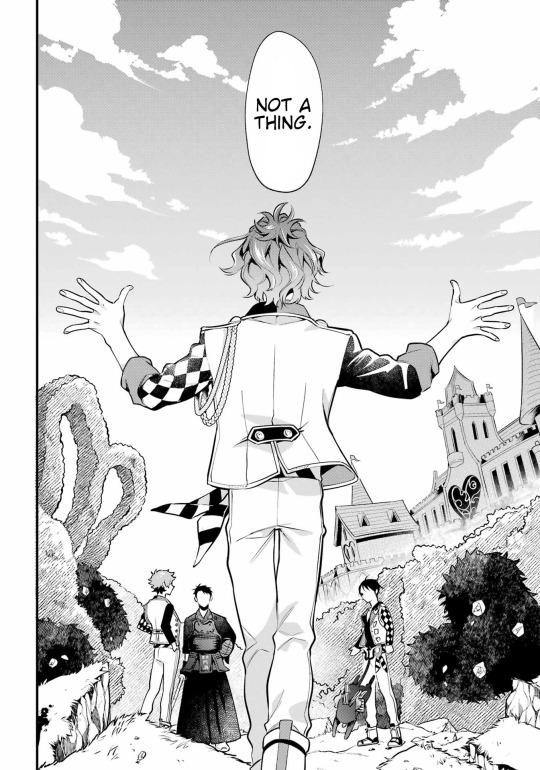
The “camera” pulls out to show the distance between Cater and the gang, which is actually a lot more than I thought it was when I saw the scene in the game. This distance shows us that he doesn’t feel like a part of their “group”, and neither does he feel like a part of the group that took Riddle to the infirmary earlier.
Trey and Riddle have the connection of being childhood friends, and Yuu is closer with Grim and Adeuce than they are to Cater. And yet, curiously, it was Cater himself who told Trey to go with Riddle rather than stay behind and help him clean up the aftermath of the OB attack. But despite staying behind with Yuuken and co., Cater doesn’t seem to make an effort to join in their banter when Grim eats the OB stone. Cater makes one passing comment, but for the most part he just… watches. He doesn’t get actively involved with the group, unlike Ace and Deuce who continue to loudly freak out over Grim putting things in his mouth.
Not only that, but look at how we, the audience, are seeing Cater—from the back, his face away from us, not unlike this pose from chapter 7 (after Cater throws Yuuken and co. out using his clones):
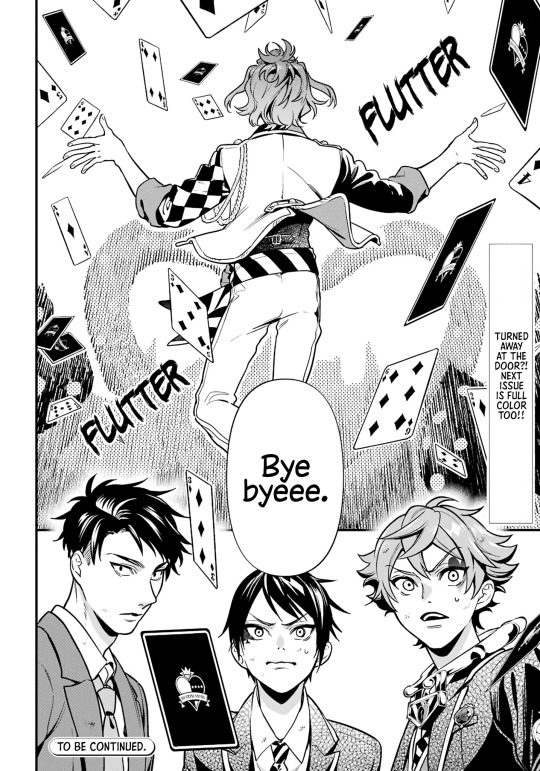
Cater’s dispersed of all his clones, turning them into a storm of playing cards. He stands alone in a garden of roses, having sent the freshmen out of Heartslabyul. Here, Cater is literally pushing people away for the purposes of the plot, but it still lines up thematically with metaphorically distancing himself from others, just as he mimics this pose in chapter 21.
Interestingly, Cater apologizes to Yuuken and co. before ejecting them. It’s nothing personal, it’s just the rules set by the dorm. Extrapolating this to chapter 21, Cater pushing everyone away from him isn’t personal or specifically discriminatory to Yuuken/Ace/Deuce/Grim either—it is Cater that is having trouble accepting others into his life, because he has yet to come to terms with himself.
What’s a little different between Cater in 7 vs 21 is that though we, the readers, are viewing Cater from the back both times, the other characters actually see him differently in 7 vs 21. In the former, the “camera” seems to imply that Cater’s back it TO Yuuken, Ace, and Deuce. He is dismissing them, telling them “bye-bye”. Cater is acting much colder towards them, even though he wears a smile as he’s banishing them from his sight. However, in chapter 21, Cater is FACING the freshmen. It’s a small but subtle difference in framing—and it indicates that, no matter how little of an improvement it may be, Cater is slowly warming up to them.
This is the contradiction of Cater Diamond, a tale told to us via visual storytelling: he wants to have deep and meaningful friendships, but stops short of putting forth the effort to obtain them. Cater mentions wishing he had a childhood friend like Trey on a few occasions. Cater implies how lonely he was as a child, never staying in one place for long enough to make any real connections. Yet Cater is seemingly ashamed of his loneliness, hiding it under a sparkly guise and clever acting. He denies his true self to his peers (Labwear vignettes) and letting embarrassment peek through when people are able to pick up on his lies (ie Trey pointing out Cater doesn’t like sweets). He won’t let himself be vulnerable to others, and he’s too scared to reach out to them himself—but surely he is capable of changing, of finally facing others.
It’s amazing that things like this are capable of being conveyed without words 😭
#Riddle Rosehearts#Cater Diamond#twst manga#Heartslabyul#twisted wonderland manga#spoilers#notes from the writing raven#Ace Trappola#Dire Crowley#Deuce Spade#Grim#Yuuken Enma#Trey Clover#Chenya#Che’nya#twst analysis#twisted wonderland analysis#twst character analysis#twisted wonderland character analysis#the manga honestly has TONS of examples of excellent visual storytelling#I’m just using this one scene as an example#episode of heartslabyul manga#episode of heartslabyul
392 notes
·
View notes